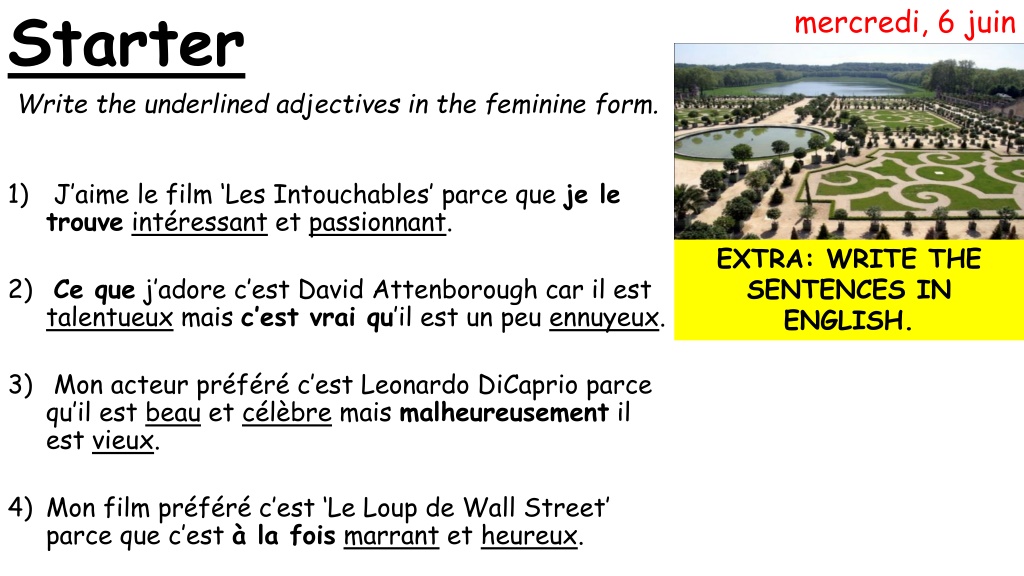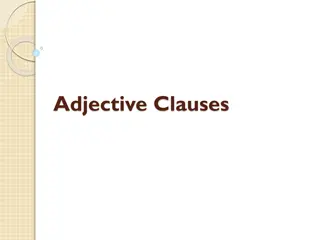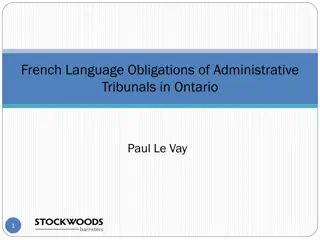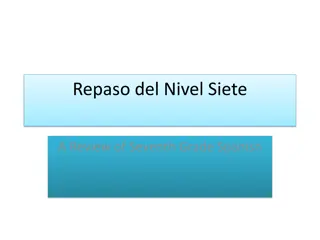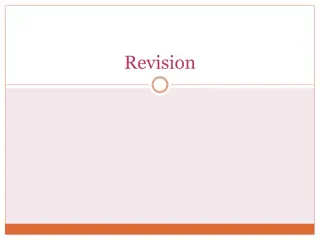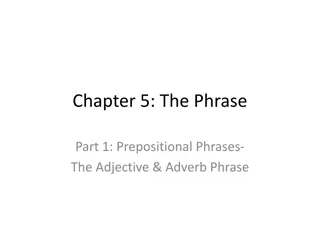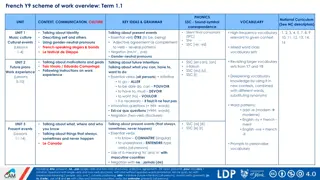Adjective Agreement in French Grammar
Adjectives in French must agree with the nouns they describe in terms of gender and number. They can either come before or after the noun, and their position can change the meaning. Learning these rules is essential for effective language use.
Download Presentation

Please find below an Image/Link to download the presentation.
The content on the website is provided AS IS for your information and personal use only. It may not be sold, licensed, or shared on other websites without obtaining consent from the author. Download presentation by click this link. If you encounter any issues during the download, it is possible that the publisher has removed the file from their server.
E N D
Presentation Transcript
Starter Write the underlined adjectives in the feminine form. mercredi, 6 juin 1) J aime le film Les Intouchables parce que je le trouve int ressant et passionnant. EXTRA: WRITE THE SENTENCES IN ENGLISH. 2) Ce que j adore c est David Attenborough car il est talentueux mais c est vrai qu il est un peu ennuyeux. 3) Mon acteur pr f r c est Leonardo DiCaprio parce qu il est beau et c l bre mais malheureusement il est vieux. 4) Mon film pr f r c est Le Loup de Wall Street parce que c est la fois marrant et heureux.
mercredi, 6 juin Il fait beau Objectif: To be able to use adjectives effectively in French. R sultat: We will have revised what we already know about adjectives in French. We will know how to place adjectives and be able to spot masculine and feminine nouns. We will learn all of the adjective agreement rules and revise these for homework.
Adjectives Adjectives are describing words. They describe a noun. A big dog. The orange car. An American tourist. A medieval church.
Position Most adjectives in French come after the noun. However, there are some which come before. These are determined by beauty, age, newness, good/bad and size. Une belle ville. Un jeune homme. Une nouvelle voiture. Un bon g teau. Une petite maison.
Some adjectives have two meanings depending on their position i.e. before or after the noun. un cher ami (a dear friend) un pull cher (an expensive jumper) un ancien l ve (a former pupil) une ville ancienne (an old town) ma propre voiture (my own car) les mains propres (clean hands) le pauvre enfant (the poor child i.e. unhappy) une famille pauvre (a poor family i.e. not rich) le seul homme au monde (the only man in the world) l homme seul pr s de la porte (the man alone/on his own by the door)
Agreement In French, adjectives must agree with the nouns they are describing. All nouns in French are either masculine or feminine. They are also either in the singular or plural form. un/le (masculine) une/la (feminine) des/les (plural)
Agreement Therefore, the same adjective may have a different ending depending on whether it is describing a masculine or feminine noun but also if the noun is singular or plural. However, these changes depend on the ending of the word. There are a number of rules to help you learn these.
Adjective endings: general In the feminine, you add e to make it agree. In the plural form, you add s to make it agree. grand(s) > grande(s) petit(s) > petite(s) joli(s) > jolie (s) fatigu (s) > fatigu e(s) marrant(s) > marrante(s) bavard(s) > bavarde(s)
Adjective endings: e Adjectives which already end in e do not change when put in the feminine form. In the plural form, you simply add s at the end. timide(s) > timide(s) jeune(s) > jeune(s) triste(s) > triste(s) mince(s) > mince(s) facile(s) > facile(s)
Adjective endings: f Adjectives which end in f change to ve in the feminine form. In the plural form, you simply add s at the end. sportif (s) > sportive(s) neuf(s) > neuve(s)
Adjective endings: x Adjectives which end in x change to se in the feminine form. The masculine plural form is the same as the masculine singular but in the feminine plural form, you add an s at the end. ennuyeux > ennuyeuse(s) s rieux > s rieuse(s) paresseux > paresseuse(s) heureux > heureuse(s)
Adjective endings: er Adjectives which end in er change to re in the feminine form. In the plural form, you simply add s at the end. fier(s) > fi re(s) dernier(s) > derni re(s) premier(s) > premi re(s)
Adjective endings: c Adjectives which end in c change to che in the feminine form. In the plural form, you simply add s at the end. franc(s) > franche(s) sec(s) > s che(s) blanc(s) > blanche(s)
Adjective endings: s/n/l Some adjectives which end in the above, double the last letter and add an e in the feminine form. In the plural form, you simply add s at the end . gros > grosse(s) bon(s) > bonne(s) ancien(s) > ancienne(s) traditionnel(s) > traditionnelle(s)
Irregulars There are a number of adjectives which are irregular. They simply have to be learned. doux > douce(s) faux > fausse(s) vieux > vielle(s) beau(x) > belle(s) nouveau(x) > nouvelle(s)
Adjective agreement Copy onto lined paper with the heading adjectives . FINISHED? Do ex.1 + 2 on P.24 + 25 of book. Ending Masculine vert bleu pic moche sportif ennuyeux dernier blanc bon Feminine verte bleue pic e moche sportive ennuyeuse derni re blanche bonne Plural (m) verts bleus pic s moches sportifs ennuyeux derniers blancs bons Plural (f) vertes bleues pic es moches sportives ennuyeuses derni res blanches bonnes general e f x er c s/n/l
